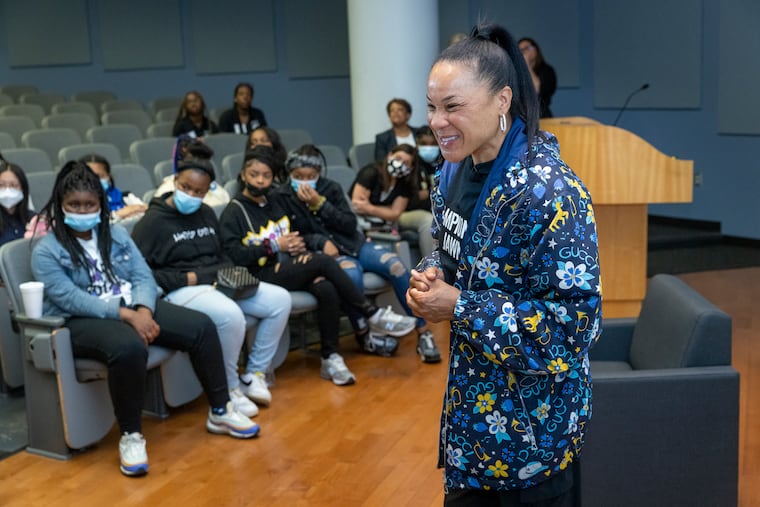Dawn Staley talks athlete mental health, her personal journey at Philadelphia Coaches Conference
Staley, a North Philly native, shared her story and some of her two-time national champion South Carolina team's keys to success at the Temple event.

Diane Richardson and Dawn Staley walked into a lecture room Tuesday morning at Alter Hall on Temple’s campus to applause from current and former coaches in the crowd. Staley, a keynote speaker at the 2022 Philadelphia Coaches Conference, shared moments in her career, and Richardson, Temple’s newly appointed women’s basketball coach, helped moderate the conversation.
“I was in Segovia, Spain, because I had a dream of being an Olympian,” Staley said. “So when I got cut from the 1992 Olympic Games, they told me two things: I was too short, and I didn’t have enough international experience, so I packed my bags and got some international experience.”
The North Philly native was one of several speakers who shared stories of leading a team to success and the challenges of being a coach. The event featured breakout sessions about inclusive sports programs, how Title IX has changed the landscape for women coaches, and addressing mental health for student-athletes.
Staley didn’t want to travel overseas to play basketball. She was living out of a suitcase and would rather be back at home on Diamond Street. It wasn’t until one night when she watched the film “House Party,” where the professor told the kids they have to do what they don’t want to do to get what they want. That line became a life motto for Staley.
While leading South Carolina to two national championships, Staley said a large factor for the Gamecocks’ success is reminding the team to stay disciplined. As a player, Staley wore a rubber band around her wrist and plucked at it every time she made a mistake in a game.
“When I got to college, I averaged about five turnovers my freshman year,” Staley said. “I actually picked this up before, because my favorite player of all time is Maurice Cheeks, he wore a rubber band, so just as a disciplinary tool I use. Then once I got my turnovers under control, I only popped it when I thought it was my mistake.”
During her closing remarks, coaches and student-athletes asked questions about how to handle the pressure and barriers from other life factors. Temple freshman Julianne Kopec, a dual-sport athlete in field hockey and track and field, told Staley she took the year off from track to focus on her mental health. Staley said to “protect your peace,” regarding distractions and not let them linger.
She reminded the coaches in the crowd of the importance of gaining the trust of their players and parents. Allowing them to fail opens opportunities for players wanting to develop on their own, and that’s how teams win championships.
When newcomers, whether freshmen or transfers, join South Carolina’s program, Staley has them meet with a sports psychologist on campus. This past season, one of her players felt uncomfortable about going to the meeting, so Staley joined her. The player realized there’s a stigma around those seeking outside help.
“Players want to know you’re there for them on their darkest days,” Staley said. “When they’re going through something, it’s the coach that’s going to be the one that is going to help carry you through those dark moments.”